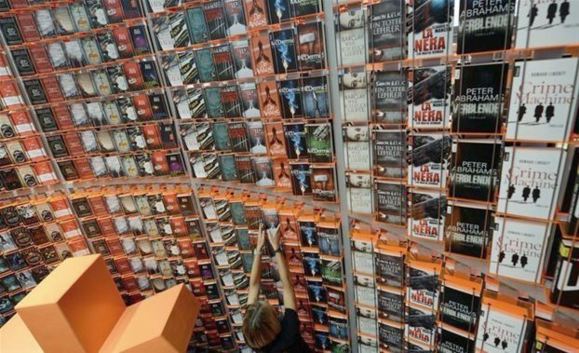
But children, who are one of the central themes of the Frankfurt Book Fair this year, paradoxically tend to be more savvy at handling the devices and are sometimes viewed as intuitively digital.
The fair, which attracts publishers, authors, translators and multimedia companies from more than 100 countries, can experience what a classroom of the future might look like, with biology or chemistry brought to life on a screen thanks to 3D glasses and a remote control.
However, experts believe schools will not switch to digital overnight and that any transition would not be without growing pains.
US consultant on education and digital matters Ron Reed said there was "a precious limited number of minutes in a day" when meaningful interaction occurred between a teacher and a student.
"So there is a requirement that the content or the tool must contribute, and it must be more than a 'nice to have', it must be 'must have' and replace something with greater efficiency and power," he said.
He warned against focusing only on a digital transition rather than a change in the overall way children learn.
"It's clearly about methodology, not just tools, and it needs to be not about products, it needs to be about practices," he said.
Even with the advent of new technology in the classroom, experts believe the role of the teacher will not gradually disappear and will continue to be key to learning, albeit with digitalised backup.
"You still need supportive teachers and good teaching... without that, technology would become nothing more than a distraction in the classroom," said Linda Zecher, chief executive of school book publishers Houghton Mifflin Harcourt (HMH).
First, though, steps to equip schools with the technology are needed.
Several years ago Portugal sold hundreds of thousands of computers for 50 euros ($65) each to schoolchildren and consequently saw improvements in its school performance tables, according to Kirstin Panton of Microsoft Partners in Learning, which promotes new technology in education.
And, say the experts, teachers need the training to ensure that embracing the new technology bears fruit.
Four schools in the US state of California used a curriculum developed on the i-Pad by HMH to teach algebra, Zecher said, noting that when it was correctly implemented, students' results increased markedly, whereas no improvement was seen when it was poorly put into practice.
And Lewis Bronze, chief executive and co-founder of Espresson Education, a company offering interactive content to teachers and schools, stressed the need to follow up once the devices were in schools.
"Commercial companies which sell products to schools have the responsibility not to just sell and walk away, but to help the teachers implement the products that we sold them," he said.
------------------------------------------------------------------------------------------------------------
The fair, which attracts publishers, authors, translators and multimedia companies from more than 100 countries, can experience what a classroom of the future might look like, with biology or chemistry brought to life on a screen thanks to 3D glasses and a remote control.
However, experts believe schools will not switch to digital overnight and that any transition would not be without growing pains.
US consultant on education and digital matters Ron Reed said there was "a precious limited number of minutes in a day" when meaningful interaction occurred between a teacher and a student.
"So there is a requirement that the content or the tool must contribute, and it must be more than a 'nice to have', it must be 'must have' and replace something with greater efficiency and power," he said.
He warned against focusing only on a digital transition rather than a change in the overall way children learn.
"It's clearly about methodology, not just tools, and it needs to be not about products, it needs to be about practices," he said.
Even with the advent of new technology in the classroom, experts believe the role of the teacher will not gradually disappear and will continue to be key to learning, albeit with digitalised backup.
"You still need supportive teachers and good teaching... without that, technology would become nothing more than a distraction in the classroom," said Linda Zecher, chief executive of school book publishers Houghton Mifflin Harcourt (HMH).
First, though, steps to equip schools with the technology are needed.
Several years ago Portugal sold hundreds of thousands of computers for 50 euros ($65) each to schoolchildren and consequently saw improvements in its school performance tables, according to Kirstin Panton of Microsoft Partners in Learning, which promotes new technology in education.
And, say the experts, teachers need the training to ensure that embracing the new technology bears fruit.
Four schools in the US state of California used a curriculum developed on the i-Pad by HMH to teach algebra, Zecher said, noting that when it was correctly implemented, students' results increased markedly, whereas no improvement was seen when it was poorly put into practice.
And Lewis Bronze, chief executive and co-founder of Espresson Education, a company offering interactive content to teachers and schools, stressed the need to follow up once the devices were in schools.
"Commercial companies which sell products to schools have the responsibility not to just sell and walk away, but to help the teachers implement the products that we sold them," he said.
------------------------------------------------------------------------------------------------------------









 Home
Home Politics
Politics









